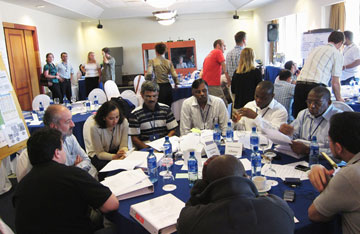Strategic Innovations Grant -- Habitat for Humanity Int'l 1
Strategic Innovations Grant
By Patrick Kelley
|
|

Staff from 11 Habitat national offices — selected for their innovative and replicable housing support services — learned from each other’s methods and from the work of housing microfinance innovator PRODEL during a gathering in Nicaragua in March 2011. ©Habitat for Humanity/Ezra Millstein.
|
|
|
|
|
|
The first group of 11 SIG winners:
HFH Ghana
HFH Paraguay
HFH Mexico
HFH Malawi
HFH India
HFH Nepal
HFH Vietnam
HFH Bangladesh
HFH Nicaragua
HFH Armenia
HFH Macedonia
Congratulations!
|
|
|
|
The Strategic Innovations Grants for Housing Support Services is a three-year learning grant that seeks to develop a sustainable and replicable Habitat for Humanity program framework for providing housing support services.
As Habitat promotes small, incremental housing solutions, our work more closely resembles community development than it does construction. Although at many times the solutions still include construction-related services, Habitat often remains more of an adviser than the implementer. Developing the skill sets and delivery mechanism for housing support services is critical for Habitat programs transitioning to incremental or housing microfinance programs. This Strategic Innovations Grant aims to help the Habitat network develop these skills, experiences, best practices and business models.
What does “learning grant” mean?
Habitat for Humanity International adapted the Learning Network methodology from the U.S. Agency for International Development and the SEEP Network. A learning network grant creates a structured platform for:
- Focusing on a common challenge (e.g., how best to provide housing support services).
- Receiving funds targeted for that purpose.
- Facilitating peer exchange and learning in a specific period.
- Developing learning products for dissemination.
The SIG-HSS began with a request for proposals to the global Habitat network. In response, we received proposals from national organizations already working on housing support services and looking to pilot innovative strategies for delivering those services to clients in conjunction with housing microfinance.
What is the learning agenda?
The learning agenda is built around the key challenges in replicating and scaling up housing support services for low-income and poor families. In order to provide value to families and other stakeholders, Habitat for Humanity seeks to demonstrate that:
- Families benefit from and demand housing support services.
- Housing support services can be sustainable and are a good investment for families and financial service providers.
- Housing support services improve the quality of the housing intervention and the quality of life for the household.
SIG-HSS participants will focus on these themes and implement their innovative proposals, generating and documenting knowledge that will help to answer or prove these hypotheses. As a result, that knowledge will be translated into documentation that will enable other national organizations and partners to replicate those successful business models.
The first grants
Staff from 11 Habitat national offices gathered in Nicaragua in March 2011 to discuss housing support services. The 11 attendees were winners of a competitive proposal process, selected from more than 25 proposals, featuring the most replicable and innovative housing support services within the global Habitat for Humanity network.
Participating programs also had an on-site look at the operations of PRODEL, one of the world’s top innovators in the area of housing microfinance and housing support services. PRODEL works alongside a network of microfinance institutions, complementing their financial services with a battery of well-trained construction technicians. Technicians advise seven to nine families a day, a rate of efficiency that keeps costs low to clients. The Habitat participants were able to probe into the specifics of how PRODEL organizes, delivers and covers the costs of serving clients.
The remaining days in Nicaragua were spent developing consensus principles and critiquing one another’s plans to provide housing support services in our respective countries. The learning group has committed to constructive mutual critique and to openness and honesty about what is not working.
On the last day, goodbyes were briefer than most Habitat workshops because this group knows we’ll be hearing from one another frequently. The Housing Support Service Grant has an emphasis on peer learning, with at least two more physical gatherings planned. Additionally, virtual exchanges on progress will take place at least quarterly. Insights and key lessons will be shared throughout the Habitat global network, with a focus on examining the implications of what is working and why.
Be on the lookout for the products this group of 11 produces in the three years of the learning grant. Output will include case studies, recorded virtual presentations, a compendium of results and perhaps a video.
Patrick Kelley is director of International Housing Finance for Habitat for Humanity International, based in Atlanta. In this role, he coordinates global strategies to expand the poor’s access to financial services for housing.